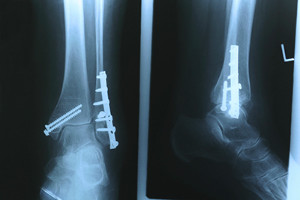
Stress fractures are tiny, gradual bone cracks caused by overuse or repetitive activities, common in athletes. Unlike sudden regular fractures, they develop over time, often affecting the feet and lower limbs. Risk factors include excessive stress, hard surfaces, and rapid changes in exercise intensity. Other causes are weak muscles, joint issues, osteoporosis, medications, poor footwear, and vitamin deficiencies. Symptoms include localized pain, swelling, tenderness, and discomfort during high-impact activities. Diagnosis involves a physical assessment, potentially followed by an X-ray or MRI. Treatment includes rest, compression, training modification, and low-impact activities. Supportive footwear, custom foot orthotics, anti-inflammatories, and exercises can also help. Surgery may be needed in severe cases. Ignoring stress fractures can lead to complete fractures, non-healing, bone necrosis, and surgery. If you are experiencing foot or ankle pain, it is strongly suggested that you make an appointment with a podiatrist who can properly diagnose the issue and provide treatment options.
Stress fractures occur when there is a tiny crack within a bone. To learn more, contact Imaze Marian Davis, DPM from Marian Davis, DPM, PA. Our doctors can provide the care you need to keep you pain free and on your feet.
How Are They Caused?
Stress fractures are the result of repetitive force being placed on the bone. Since the lower leg and feet often carry most of the body’s weight, stress fractures are likely to occur in these areas. If you rush into a new exercise, you are more likely to develop a stress fracture since you are starting too much, too soon. Pain resulting from stress fractures may go unnoticed at first, however it may start to worsen over time.
Risk Factors
- Gender – They are more commonly found in women compared to men.
- Foot Problems – People with unusual arches in their feet are more likely to develop stress fractures.
- Certain Sports – Dancers, gymnasts, tennis players, runners, and basketball players are more likely to develop stress fractures.
- Lack of Nutrients – A lack of vitamin D and calcium may weaken the bones and make you more prone to stress fractures
- Weak Bones – Osteoporosis can weaken the bones therefore resulting in stress fractures
Stress fractures do not always heal properly, so it is important that you seek help from a podiatrist if you suspect you may have one. Ignoring your stress fracture may cause it to worsen, and you may develop chronic pain as well as additional fractures.
If you have any questions, please feel free to contact our office located in Miami, FL . We offer the newest diagnostic and treatment technologies for all your foot care needs.

